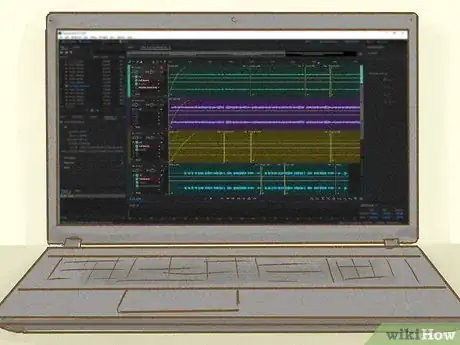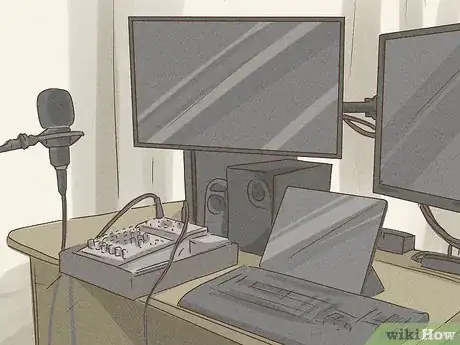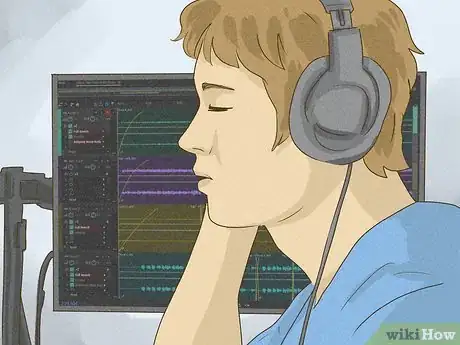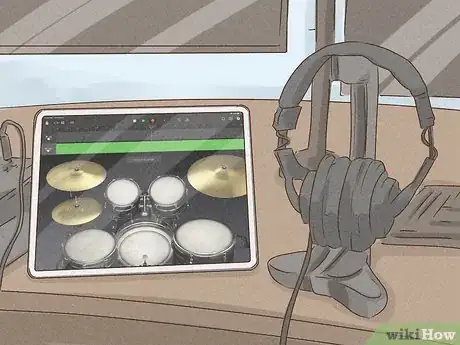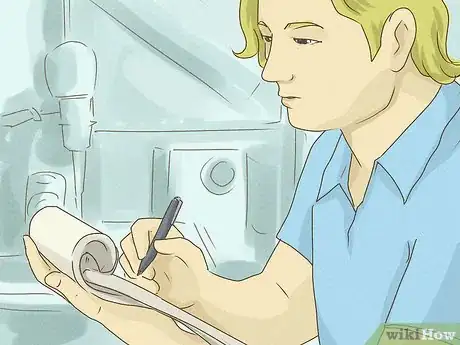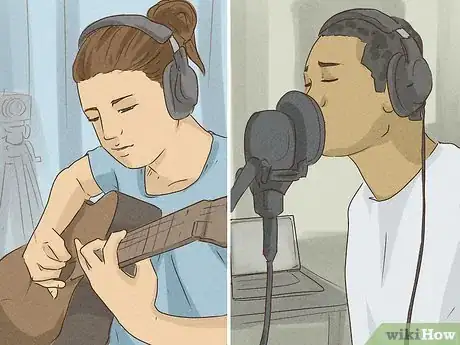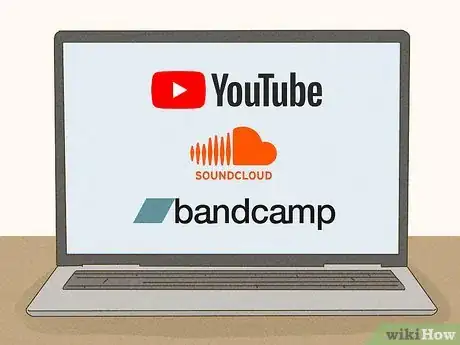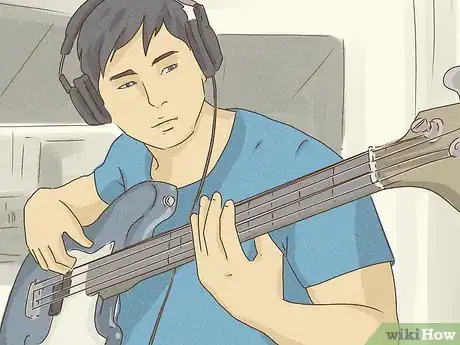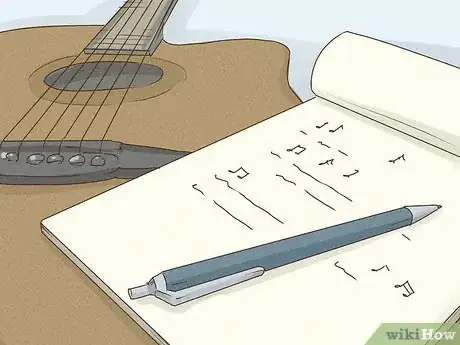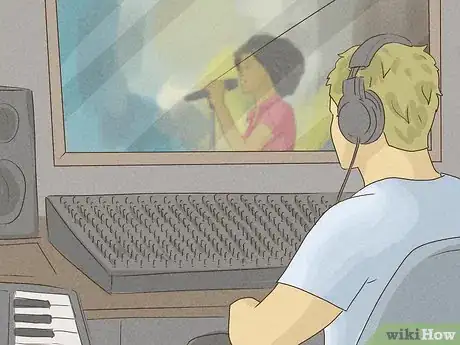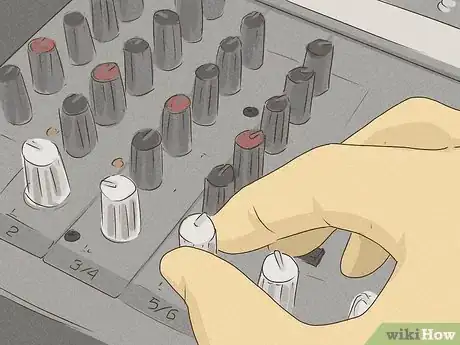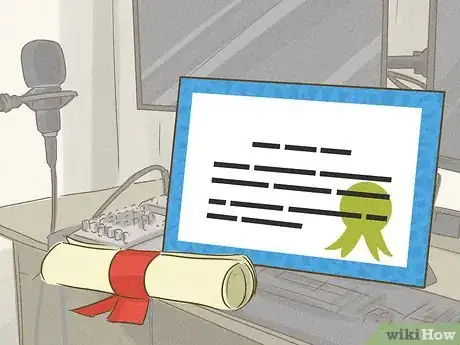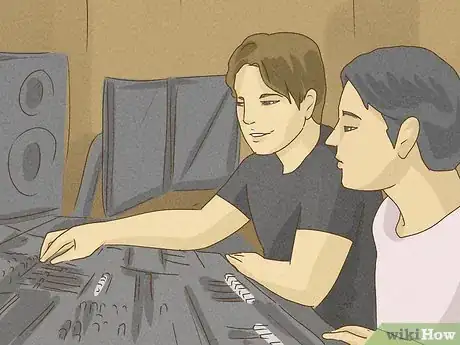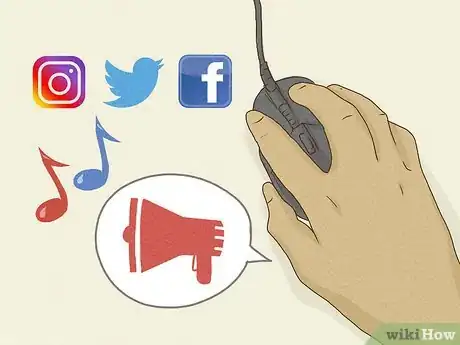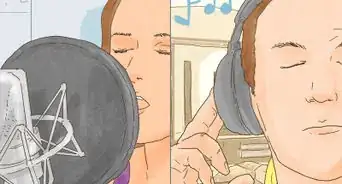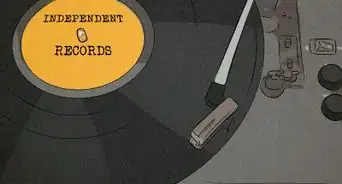This article was co-authored by Timothy Linetsky. Timothy Linetsky is a DJ, producer, and music educator that has been making music for over 15 years. He is a certified Ableton trainer and creates educational YouTube videos focused on producing electronic music. He has over 90,000 YouTube subscribers.
There are 7 references cited in this article, which can be found at the bottom of the page.
wikiHow marks an article as reader-approved once it receives enough positive feedback. This article received 12 testimonials and 89% of readers who voted found it helpful, earning it our reader-approved status.
This article has been viewed 1,298,896 times.
A music producer can be responsible for a variety of tasks, including composing the music, managing an artist, hiring musicians, mixing and mastering the song, and any other component that goes into making music. With hard work, dedication, knowledge, the right connections, and this wikiHow tutorial, you can make it in the music industry!
Steps
Creating Music
-
1Set up a digital audio workstation to create your music. A digital audio workstation, or DAW, is a computer setup and software program that you use to make your music. Even if you plan to only record instruments instead of creating music digitally, you still need to know how to use a program that will allow you to record, layer, alter, and mix the sounds so it sounds good.[1]
- Download a program to your computer to start building your workstation.
- Popular DAWs you can purchase include FL Studio, Bitwig, and Pro Tools.
- Many DAWs include tutorials that will teach you how to use them.
-
2Create a studio space so you can record. The right studio environment can help both you and any producers, musicians, or artists you collaborate with come up with new and exciting music. Set up a studio that has all of the equipment and instruments that you’ll need. Make the studio space comfortable so both you and the people you work with enjoy working there.[2]
- Make the recording space soundproof so your recordings are high quality.
- Have comfy chairs and couches so you can relax while you’re working.
Advertisement -
3Come up with a catchy rhythm and hook. A hook is a short riff or musical sound that makes a song catchy and good. Whether you’re playing an instrument or making a beat on using a digital program, start writing a song by coming up with a hook or rhythm that you can use to guide the rest of your song creation.[3]
- Play around with different sounds until you find something that you like.
- Listen to other music to come up with interesting combinations.
- Remix a classic song into something brand new. For instance, you could sample vocals from a church choir and add them to a catchy electronic dance beat.
-
4Add a drum section to the track to give a beat to the song. You can use a recording program to add drum samples and loops or you can record a drummer playing on a drumset. Add the percussion layer to your track to give a cadence and tempo to the rhythm and hook.[4]
- Make sure the beat makes sense with the rhythm. For example, if you’ve got a fast-paced punk rock guitar riff as a hook, you’ll want a fast kick and snare to go along with it.
-
5Write lyrics that suit the mood of the music. Come up with lyrics that fit the rhythm of your song and match the overall mood of the melody. For instance, if the song is low and sad, the lyrics should match the feeling conveyed by the music.[5]
- Try singing the words or having a singer use them to see how they sound out loud.
- Have a friend who writes poetry or lyrics try to come up with some for your songs.
-
6Collaborate with other musicians to make new music. Bring in other singers and musicians to add layers to your songs. Working together with other people on a song will bring different tastes, styles, and talents that can produce new and unique sounds.[6]
- Reach out to musician friends or acquaintances to see if they’re interested in working on a project with you.
- If you need a specific musician, like a drummer or guitar player, you can pay one to come to your studio and work with you. Look online or contact other studios for information about hiring a musician.
-
7Use the internet to broadcast your music to the world. In today’s world, you don’t necessarily need the support or backing of a large record label to get your music heard. The internet allows you to upload and spread your music so it can be heard by millions of people all over the world. If you’re trying to get yourself and your music heard, use the internet to put it all out there.[7]
- Use websites like Bandcamp, Soundcloud, and YouTube to upload your songs so you can share them with other people.
- Create social media pages for your music and put your songs on there so they can be heard and shared by listeners.
Tip: Make a website for yourself or your band so you can post updates, tour dates, music, and merchandise. You can use a hosting site or make a website using a service such as Google Sites.
Understanding Music Production
-
1Play multiple instruments to understand how they work. You don’t need to be a master guitar player or drummer, but knowing how to play a few instruments will improve your musical ear and will help you understand what it takes to make an instrument sound good. Take lessons or learn on your own how to play multiple instruments.[8]
- Learn how to play the drums so you can develop an understanding of how rhythm and beats work.
- Knowing the basics of an instrument such as a guitar will allow you to better collaborate with professional guitar players because you can make suggestions and get better performance from them.
Tip: The keyboard or piano can be an especially useful instrument to learn as a producer because you can create a variety of sounds with a digital keyboard.
-
2Take a musical theory course so you can better understand music. Musical theory refers to the study of composition, rhythm, harmony, and all of the other components that make up music. Earn a degree in musical theory or take a class so you can understand how to compose music, relate to sound engineers, and communicate with artists in their own, musical language.[9]
- Look for a music theory course that you can take at local colleges or music education schools.
- Search for an online musical theory course you can sign up for.
- Study books on musical theory the learn about it on your own.
-
3Listen to music constantly to come up with new ideas. As a producer, you need to be familiar with all of the current trends in music as well as be able to think of new and original compositions. Listening to different genres and styles of music can spark your creative mind and give you unique ideas for your own songs. Have music playing every chance you get![10]
- Look for artists and genres that you’ve never listened to before to inspire your own work and to stay current.
- If you plan to be a producer in a specific genre, like hip-hop or pop-punk, make sure you’re listening to new artists in your own genre so you’re up to date with new musical developments in your field.
-
4Spend time in professional recording studios to learn how they work. Get a job or an internship at a recording studio in your area so you can watch professional producers work. You can also visit or pay for recording time in a studio so you can see what professional studio looks like and how it operates.[11]
- Some recording studios may let you hang out if you ask them.
- You can take tours of larger record label studios to see the best of the best setups.
-
5Learn how to use an audio mixer. An audio mixer, or soundboard, is a device that allows you to control multiple audio channels, altering the volume and effects of individual sounds to create a cohesive composition. You can take lessons from a music teacher or use video tutorials to learn how to use one so you can learn how to properly balance the layers of sounds that make up a song.[12]
- Search online for tutorials on how to use an audio mixer.
- Some audio mixers may come with instructional videos or pamphlets when you purchase them.
- Buy a book about how to use a mixer that you can keep handy as a reference.
Working in the Music Industry
-
1Earn a degree in music production to gain the knowledge you need. Studying music production will teach you how to use technology to create music. You’ll also meet many other people who will end up working in the music industry, so you’ll make connections and friends that you can collaborate with in the future. Enroll in a school that offers a music production degree.[13]
- Look for universities that have music production programs that you can enroll in.
- Take an online music production course so you can earn a certification and learn the tools of the trade.
-
2Apply for an internship at a record label to learn the business. Record labels are companies that make, sell, and promote music. You can learn everything there is to know about the music industry and how to be a successful producer by working at a record label. Lookup a record label online and find out if they have any internships that you can apply for.[14]
- Write a cover letter that talks about why you want to be a producer so you can include it in your application.
- Research the record label you want to apply for so you’re familiar with their music and you can answer any questions they have if you get interviewed for the internship.
- Ask a professor or teacher if they can help you get an internship at a label or music production company.
-
3Promote yourself as a producer as often as you can. Whenever someone asks you what you do or anytime someone brings up music, make sure you mention that you’re a producer. Post your music on your personal social media sites to let people hear your work. You never know who may refer you to someone working on a musical project.[15]
- Avoid bragging about being a producer so you don’t turn people off.
- For example, you could say something like, “Oh, you like R&B music? Me too! I’m actually a producer, so if you know anybody looking to collaborate, let me know!”
-
4Network with other musicians and producers as often as you can. At concerts, parties, recording sessions, or even on social media, try to meet as many people in the industry as you can. You can use your contacts to find people to collaborate with, book concerts, promote your music, and many other benefits.[16]
- Look online for networking events that you can attend.
- Talk to other musicians that you meet at events and get to know them.
Tip: Print business cards and keep them on you so you can hand them out to people that you meet.
Expert Q&A
-
QuestionHow do I start producing music at home?
 Timothy LinetskyTimothy Linetsky is a DJ, producer, and music educator that has been making music for over 15 years. He is a certified Ableton trainer and creates educational YouTube videos focused on producing electronic music. He has over 90,000 YouTube subscribers.
Timothy LinetskyTimothy Linetsky is a DJ, producer, and music educator that has been making music for over 15 years. He is a certified Ableton trainer and creates educational YouTube videos focused on producing electronic music. He has over 90,000 YouTube subscribers.
Music Producer & Instructor I started collecting vinyl records when I was 14 or 15, and I started making beats out of them. Then, I learned to use production software by watching online tutorials and mostly just messing around. Mastering the technology and producing your own music takes time, effort, and practice, but if you're really interested and willing to learn, you'll be able to do it!
I started collecting vinyl records when I was 14 or 15, and I started making beats out of them. Then, I learned to use production software by watching online tutorials and mostly just messing around. Mastering the technology and producing your own music takes time, effort, and practice, but if you're really interested and willing to learn, you'll be able to do it! -
QuestionHow easy is it to produce music?
 Community AnswerIt depends on how much time you put into it. It may take days to understand a single music term and how to apply it. Alan Walker says its took him over a year to understand music production.
Community AnswerIt depends on how much time you put into it. It may take days to understand a single music term and how to apply it. Alan Walker says its took him over a year to understand music production. -
QuestionHow do I know that my track is good? Where can I upload my track?
 Community AnswerIf you want to make sure your track is good or not, the best way is to call a few friends of yours and have them listen to your song. You could upload your track to any number of online servers or media sites.
Community AnswerIf you want to make sure your track is good or not, the best way is to call a few friends of yours and have them listen to your song. You could upload your track to any number of online servers or media sites.
References
- ↑ https://medium.com/learning-lab/how-i-learnt-music-production-and-produced-a-song-in-one-month-99abcdb7d224
- ↑ https://www.bbc.com/news/entertainment-arts-30009922
- ↑ https://medium.com/learning-lab/how-i-learnt-music-production-and-produced-a-song-in-one-month-99abcdb7d224
- ↑ https://medium.com/learning-lab/how-i-learnt-music-production-and-produced-a-song-in-one-month-99abcdb7d224
- ↑ https://medium.com/learning-lab/how-i-learnt-music-production-and-produced-a-song-in-one-month-99abcdb7d224
- ↑ https://www.forbes.com/sites/meimeifox/2019/02/13/how-to-make-it-in-the-music-industry/#647968e11a65
- ↑ https://www.pewresearch.org/internet/2004/12/05/artists-musicians-and-the-internet/
- ↑ https://www.bbc.com/news/entertainment-arts-30009922
- ↑ https://medium.com/learning-lab/how-i-learnt-music-production-and-produced-a-song-in-one-month-99abcdb7d224
- ↑ https://www.theguardian.com/culture/2012/jan/02/top-artists-creative-inspiration
- ↑ https://www.forbes.com/sites/meimeifox/2019/02/13/how-to-make-it-in-the-music-industry/#647968e11a65
- ↑ https://www.musictech.net/tutorials/beginners-guide/
- ↑ https://www.happynetty.com/stories/top-three-benefits-of-enrolling-in-an-electronic-music-production-course
- ↑ https://www.forbes.com/sites/meimeifox/2019/02/13/how-to-make-it-in-the-music-industry/#647968e11a65
- ↑ https://www.forbes.com/sites/meimeifox/2019/02/13/how-to-make-it-in-the-music-industry/#647968e11a65
- ↑ https://www.forbes.com/sites/meimeifox/2019/02/13/how-to-make-it-in-the-music-industry/#647968e11a65
About This Article
If you want to become a music producer, experiment with a digital audio workstation, which will allow you to arrange and edit the music that you record. When you’re mixing a song, pick sounds which fit well together, but don’t be afraid to experiment with instrument and sound combinations that have never been tried before. Once you have a few tracks mixed, put your music on social media and music websites to market yourself as a producer. Read on to learn which digital audio workstations are best for different musical genres.
